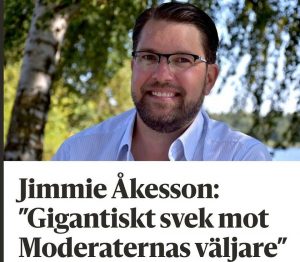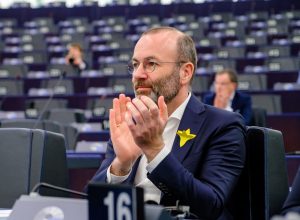
Since 2019 a radical green agenda had penetrated almost all other European agendas.Continue reading

As talks of a Hungarian government party, Fidesz, membership in the European Conservatives and Reformist (ECR) group in the European Parliament are becoming ever more frequent, the disquiet in the left-faction of the ECR is growing. The latest party to threaten with departure from the group is the Slovakian SaS (Freedom and Solidarity), who perceive sharing the same political faction with Viktor Orbán’s party a red line.
“It is simply a lie that we will end up in the same faction as Viktor Orbán after the European elections. We will be against newly elected MEPs from Fidesz joining the ECR faction after the elections. If this happens, we will leave this faction,” said Richard Sulík, the leader of the SaS, and candidate for the European Parliament. According to media reports, his party has already had offers from the Manfred Weber-lead European People’s Party (EPP) in case they did decide to leave the center-right ECR.
The very fact that Sulík’s party was able to join the ECR is bordering the inexplicable, as in their home country they are considered anything but conservatives. At home they stand hand-in-hand with the far-left Progressive Slovakia, and since 2020 they have been part of liberal governments, then caretaker government, that has brought Slovakia to the bring of political anarchy. Although Sulík had acknowledged Viktor Orbán’s decision to close Hungary’s borders during the migrant invasion in 2015 and onward as right, certain members of his own party have taken a different look even at this crucial question of the inviolable character of national borders. In other issues like European federalism, Ukraine or gender propaganda, they closely resemble the current European People Party’s (EPP) teutonized, eurofederalist profile.
The SaS has currently only two MEPs in the ECR, and stands between 6-7% in recent polls for the June 9 EP elections, down from 9.6% in 2019. This would give them a single MEP, Richard Sulík himself, who is leading SaS’ election list.
Threats of his departure would certainly be no deterrent for Giorgia Meloni’s FdI or Poland’s PiS in order to consider a possible invitation for Fidesz into the ECR.

Viktor Orbán with Giorgia Meloni. Photo: Facebook Orbán Balázs
Although no formal negotiations have even started about a possible Fidesz membership in the ECR, and Fidesz may well remain without affiliation in the EP after the June elections, the reshuffle has already started on the European right. Not only parties, such as the SaS, whose political program does not even resemble Christian-conservative values, are on the move, but some formally right-wing parties are also showing signs of discomfort at Fidesz’s political proximity.
Their stance on the war in Ukraine, as well as domestic government coalitions with left-to-center parties seem to be the main reason for their opposition to the Hungarian government party’s possible accession. Among others, the anti-migration Sweden Democrats have also signaled their opposition to the move. Their leader, Jimmie Akesson’s ambivalent stance towards Viktor Orbán predates the war in Ukraine, but the decisive factor could be that his party’s support for Prime Minister Ulf Kristesson’s Moderate Party (EPP) means that they are silent partners to a left-to-center Eurofederalist, multiculturalist policy that perfectly describes the EPP’s current ideological profile. Despite his impassioned remarks on social media expressing dissatisfaction with Kristersson’s social and immigration policies,
in practice Akesson’s SD have been reduced to a reluctant ally rubber-stamping the decisions of the increasingly left-leaning Swedish Moderates.

Jimmie Akesson’s Facebook post reads: gigantic betrayal of the Moderate voters.
Staying North, the anti-immigration True Finns have also threatened to leave the ECR in case Fidesz were to join. Their main issue is the Hungarian government party’s stance on Ukraine, namely its refusal to send weapons to the embattled nation. They went as far as rebuking their own MEP, Teuvo Hakkarainen, for expressing his support for Fidesz’s ECR membership, and revoking his nomination for the June EP elections.

The Finnish MEP has become a victim of a witch-hunt within his own party for expressing support for Fidesz’s membership. Photo: Facebook Teuvo Hakkarainen
Romania’s ultra-nationalist AUR are also set to leave the group in case the Hungarians were to join, although their motifs are of pure anti-Hungarian chauvinism, as they regularly churn out offensive propaganda against the Hungarian minority in Transylvania, as well as the government in Budapest. They claim that the “Hungarians have territorial claims that make it impossible for us to be in the same alliance. We do not want to be friends with Putin’s friend”.
The first claim is obviously an outright lie, while the second is also a strongly questionable misconception aimed at justifying their own extremist anti-Hungarian sentiments.
Another ECR party, Latvia’s National Alliance (NA) have also signaled their intention to oppose Fidesz’s membership, their motifs, apart from their strong anti-Russian sentiments, is to signal towards Brussels and Washington that they are on board with the current sum total of Euro-Atlantic geopolitical goals, as opposed to Fidesz’ strongly critical stance towards the European Union’s leadership and the Biden administration.
If indeed there should be an exodus of parties from the ECR, with parties such as the Slovak SaS joining the EPP, this could further dilute the already left-leaning group’s conservative profile. Viktor Orbán made no secret of what he thinks of Weber’s EPP when he said that “the EPP has finally become an appendage of the European left. On migration, on family values, on national sovereignty, on the great issues of our time, there is no longer any difference between the EPP and the European left. There is good reason for the parties of the European Left and their leaders to light bonfires. They have gained another party.”
There is of course no love lost between the Viktor Orbán and the Manfred Weber-lead EPP. Their conflict culminated with the Hungarian Prime Minister’s objection against Manfred Weber’s candidacy for the post of European Commission president, and of course Fidesz’ departure from the group.
Although Weber still employs some anti-left rhetoric in his social media posts against the European Parliament’s current liberal and left-wing majority, under his leadership the EPP has become indistinguishable from other liberal groups’ output when it comes to actual voting results and policies.
Since he has made the supporting of Ukraine a prerequisite for EPP membership for new candidates, he has severely restricted the pool of genuinely conservative applicants for his party.

Photo: Facebook Manfred Weber
The ECR itself is ahead of a watershed moment, with or without a Fidesz membership. It has an opportunity to clarify its own political values by shedding ideologically mismatched parties from its ranks, such as the liberals from Slovakia, or the ultra-nationalist extremists from Romania. As to the Northern and Baltic members’ dissatisfaction, the differences between them and Fidesz have shown that making military support for Ukraine the sole criterion of conservative cooperation is eroding the strength of European anti-globalist forces, while playing into the hands of the pro-migration, anti-sovereigntist political mainstream.
Should the size of the Fidesz delegation stay the same after the 9 June elections, their 12 MEPs would easily compensate for the loss after the potential departure of the above parties. Yet apart from the numbers game, the entire reshuffle is an opportunity to redefine what European conservativism really should be. Clearly, the Polish PiS, one of the major ECR founding members, although uneasy about the Orbán government’s stance on Ukraine, had understood that the conflict in the East cannot become a wedge in the cooperation between national-conservative parties.
Meloni’s FdI, along with other ECR members, are also likely to support the group’s expansion in the Hungarian government party’s direction, signalling a clear dissociation from the “Weber doctrine”,
that is, defining civic conservatism as staying in line with Washington’s geopolitical interests vis-a-vis Russia. With Fidesz, the ECR would become a conservative grouping more attuned to the new, multi-polar world – the questions is, whether they are willing to risk an open rift with the EU’s dominant forces, including the EPP, that would define their entire coming electoral period.
Featured Image: Facebook Richard Sulík